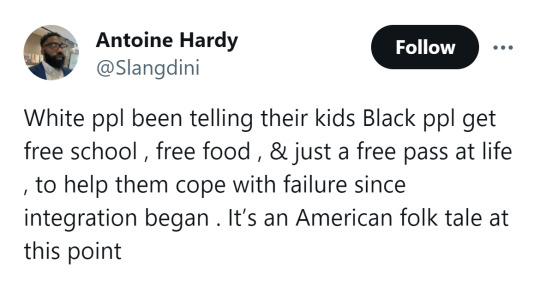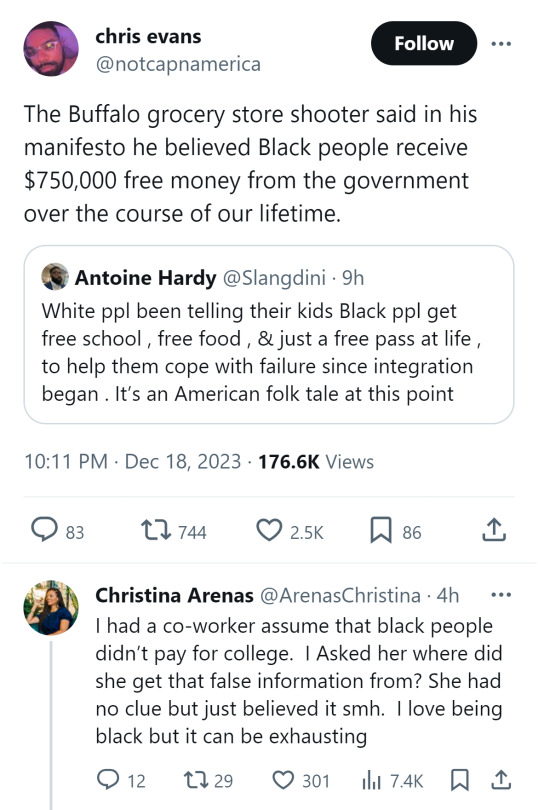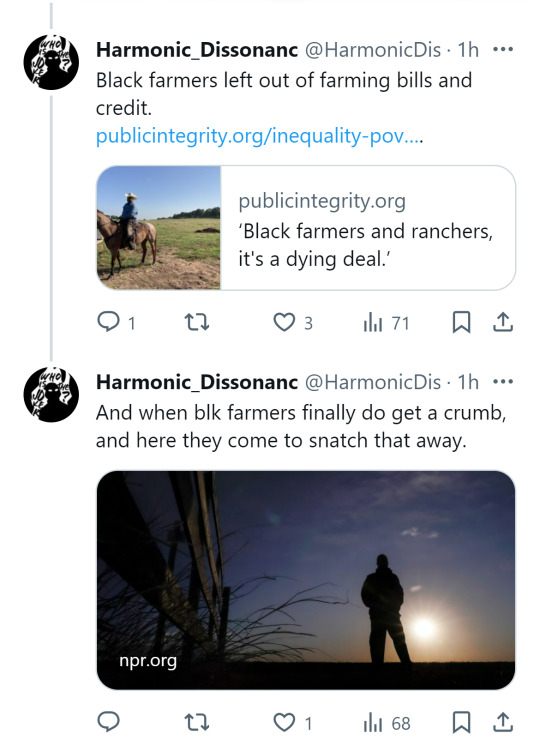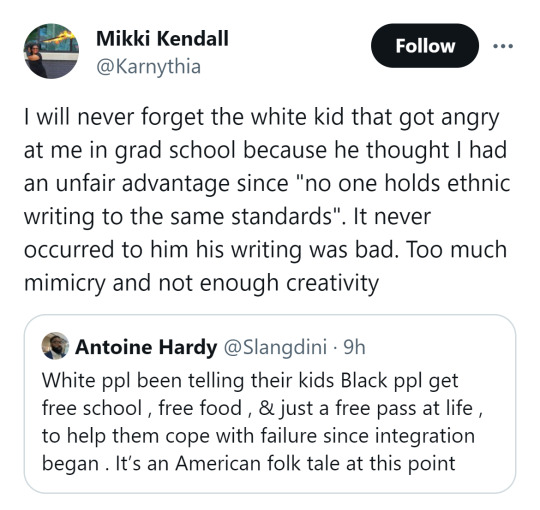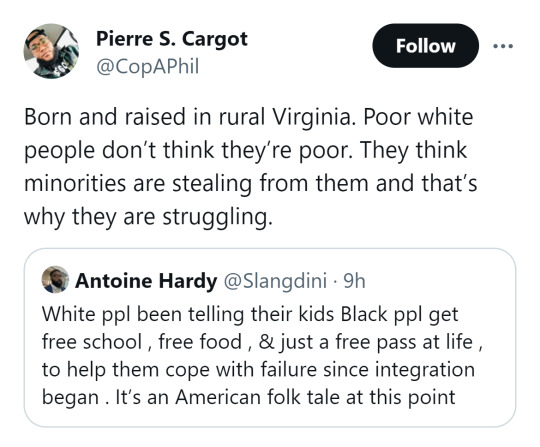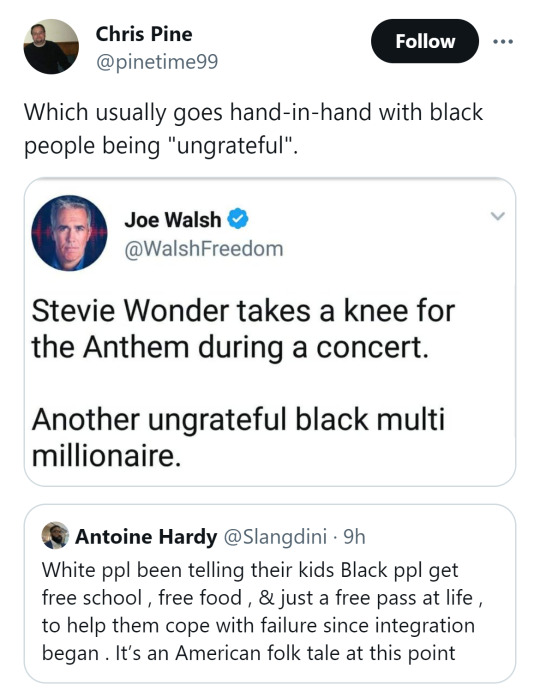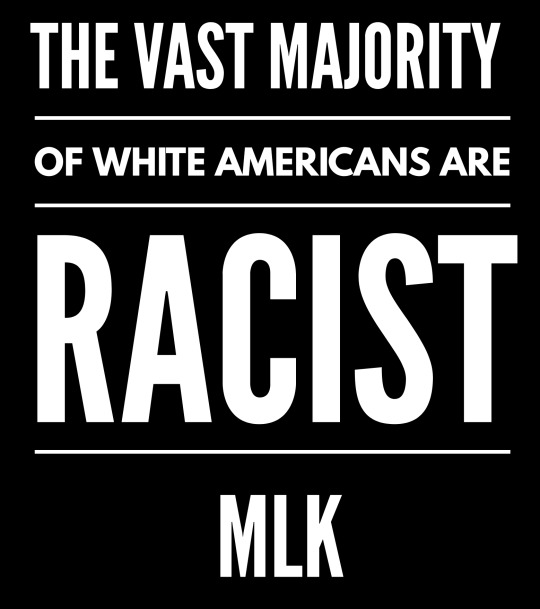Text

I love you Eda the Owl Lady <3
263 notes
·
View notes
Text
A lot of people seem to implicitly believe (or desperately want to believe) something to the effect of "the facts of the world make my value system convenient."
For example, anarchists tend to have a value system which says that hierarchies and systems of domination are inherently unethical. This is something I agree with very strongly, and is why I often describe myself as an anarchist. A common question then posed to anarchists is how, without hierarchy, bureaucracy, or other such systems of social control/management, it would be possible to achieve the large-scale coordination needed to accomplish certain tasks that are considered necessary for human flourishing: industrial-scale production of antibiotics and vaccines, management of carbon emissions, maintenance of a power grid, and basically anything else that requires a sustained, large-scale and legible set of social processes. Rather than addressing these (in my view) very valid concerns, most anarchists respond by dismissing the question. They claim, for example, that without capitalism we would have no need to manage carbon emissions, because the market incentives to emit would be gone. Or that industrial production of medical supplies isn't really necessary, because sufficient quantities could easily be made by small-scale local producers, etc.
And I'm always tempted to say "wow, how incredibly convenient". We don't even have enough understanding of human psychology to successfully model human behavior in our own society, and yet you're absolutely sure that in your hypothetical future society, humanity would just... no longer have any desire to engage in high-emission activities? You're absolutely sure that the physics and biology and chemistry and engineering involved in medical production all just happen to work out to make small-scale manufacture consistently doable? You're absolutely sure that all these problems people are posing just happen to be non-problems?
You may be right, certainly. It would be lovely if these things all worked out to be non-problems. But that's not something that can be determined through political theory. It's something that can only be determined through rigorous empirical study and technical work, and the conclusions that work comes to might just not turn out to be very convenient ones. This is why I sometimes don't call myself an anarchist.
But either way, my values stay unchanged. No matter what the answers to these technical questions are, I remain absolutely steadfast in my belief that systems of hierarchy and control are deeply unjust things. Either way, I will continue (as much as I can) to work towards a society in which these things can be done away with to the greatest degree possible, and their deleterious effects can be mitigated wherever they remain. And I think that I'm far more able to actually do that for being honest with myself about what the challenges of this project really are.
I want to be clear, this is not just a tendency I find with anarchists. I've encountered people of basically every political ideology engaging in this sort of dismissive optimism, insisting that the questions raised by their value system in fact demand no answers. But ultimately, it's not intellectually honest to insist that the universe has conspired to make your value system an easy one to hold. And that kind of intellectual dishonesty actually gets in the way of successfully working towards realization of the values you have.
Which is why, in my view, the most effective way to approach your social values is not as positions to be defended but as goals to be achieved. Inconvenient facts are not points against you, they are obstacles in your way. Perhaps they're insurmountable obstacles (that really would be, I think, a point against you), but perhaps they're not. The only way to find out is to acknowledge them as genuine obstacles and to try to find solutions. The inability to acknowledge the challenges in front of oneself has been the downfall of many, many movements, and the solution is as simple as having a little intellectual humility. And personally, I'd rather not let my ego get in the way of building a better world.
9K notes
·
View notes
Text

Jewish fairy who spreads joy
2K notes
·
View notes
Text
In Defense of Shitty Queer Art
Queer art has a long history of being censored and sidelined. In 1895, Oscar Wilde’s novel The Picture of Dorian Gray was used as evidence in the author’s sodomy trials. From the 1930s to the 1960s, the American Hays Code prohibited depictions of queerness in film, defining it as “sex perversion.” In 2020, the book Steven Universe: End of an Era by Chris McDonnell confirmed that Rebecca Sugar’s insistence on including a sapphic wedding in the show is what triggered its cancellation by Cartoon Network. According to the American Library Association, of the top ten most challenged books in 2023, seven were targeted for their queer content. Across time, place, and medium, queer art has been ruthlessly targeted by censors and protesters, and at times it seems there might be no end in sight.
So why, then, are queer spaces so viciously critical of queer art?
Name any piece of moderately-well-known queer media, and you can find immense, vitriolic discourse surrounding it. Audiences debate whether queer media is good representation, bad representation, or whether it’s otherwise too problematic to engage with. Artists are picked apart under a microscope to make sure their morals are pure enough and their identities queer enough. Every minor fault—real or perceived—is compiled in discourse dossiers and spread around online. Lines are drawn, and callout posts are made against those who get too close to “problematic art.”
Modern examples abound, such as the TV show Steven Universe, the video game Dream Daddy, or the webcomic Boyfriends, but it’s far from a new phenomenon. In his book Hi Honey, I’m Homo!, queer pop culture analyst Matt Baume writes about an example from the 1970s, where the ABC sitcom titled Soap was protested by homophobes and queer audiences alike—before a single episode of the show ever aired. Audiences didn’t wait to actually watch the show before passing judgment and writing protest letters.
After so many years starved for positive representation, it’s understandable for queer audiences to crave depictions where we’re treated well. It’s exhausting to only ever see the same tired gay tropes and subtext, and queer audiences deserve more. Yet the way to more, better, varied representation is not to insist on perfection. The pursuit of perfection is poison in art, and it’s no different when that art happens to be queer.
When the pool of queer art is so limited, it feels horrible when a piece of queer art doesn’t live up to expectations. Even if the representation is technically good, it’s disappointing to get excited for a queer story only for that story to underwhelm and frustrate you.
But the world needs that disappointing art. It needs mediocre art. It even needs the bad art. The world needs to reach a point where queer artists can fearlessly make a mess, because if queer artists can only strive for perfection, the less art they can make. They may eventually produce a masterpiece, but a single masterpiece is still a drop in the bucket compared to the oceans of censorship. The only way to drown out bigotry and offensive stereotypes created by bigots is to allow queer artists the ability to experiment, learn through making mistakes, and represent their queer truth even if it clashes with someone else’s.
If queer artists aren’t allowed to make garbage, we can never make those masterpieces everyone craves. If queer artists are terrified at all times that their art will be targeted both by bigots and their own queer communities, queer art cannot thrive.
Let queer artists make shitty art. Let allies to queer people try their hand at representation, even if they miss the mark. Let queer art be messy, and let the artists screw up without fear of overblown retribution.
It’s the only way we’ll ever get more queer art.
_
Like this essay? Tip me on Ko-Fi, pledge to my Patreon, or commission an essay on the topic of your choice!
1K notes
·
View notes
Text
"Tuesday’s [April 9, 2024] definition-shifting court ruling means nearly 50 governments must now contend with a new era of climate litigation.
Governments be warned: You must protect your citizens from climate change — it’s their human right.
The prescient message was laced throughout a dense ruling Tuesday from Europe’s top human rights court. The court’s conclusion? Humans have a right to safety from climate catastrophes that is rooted in their right to life, privacy and family.
The definition-shifting decision from the European Court of Human Rights means nearly 50 governments representing almost 700 million people will now have to contend with a new era of litigation from climate-stricken communities alleging inaction.
While the judgment itself doesn’t include any penalties — the case featured several women accusing Switzerland of failing to shield them from climate dangers — it does establish a potent precedent that people can use to sue governments in national courts.
The verdict will serve “as a blueprint for how to successfully sue your own government over climate failures,” said Ruth Delbaere, a legal specialist at Avaaz, a U.S.-based nonprofit that promotes climate activism...
Courting the courts on climate
The European Court of Human Rights was established in the decade following World War II but has grown in importance over the last generation. As the judicial arm of the Council of Europe, an international human rights organization, the court’s rulings are binding on the council’s 46 members, spanning all of Europe and numerous countries on its borders.
As a result, Tuesday’s [April 9, 2024] ruling will help elevate climate litigation from a country-by-country battle to one that stretches across continents.
Previously, climate activists had mostly found success in suing individual countries to force climate action.
A 2019 Dutch Supreme Court verdict forced the Netherlands to slash its greenhouse gas emissions by 25 percent, while in 2021 a French court ruled the government was responsible for environmental damage after it failed to meet greenhouse gas reduction goals. That same year, Germany’s Constitutional Court issued a sweeping judgment that the country’s 2019 climate law was partly “unconstitutional” because it put too much of the emissions-cutting burden on future generations.
Even in the U.S., young environmental activists won a local case last year against state agencies after arguing that the continued use of fossil fuels violated their right to a "clean and healthful environment."
But 2024 is shaping up to be a turning point for climate litigation, redefining who has a right to sue over climate issues, what arguments they can use, and whom they can target.
To start, experts overwhelmingly expect that Tuesday’s ruling will reverberate across future lawsuits — both in Europe and globally. The judgment even includes specifics about what steps governments must take to comply with their new climate-related human rights obligations. The list includes things like a concrete deadline to reach climate neutrality, a pathway to getting there, and evidence the country is actually on that path...
Concretely, the verdict could also affect the outcomes of six other high-profile climate lawsuits pending before the human rights court, including a Greenpeace-backed suit questioning whether Norway's decision to grant new oil and gas licenses complies with its carbon-cutting strategy.
An emerging legal strategy
In the coming months, other international bodies are also expected to issue their own rulings on the same thorny legal issues, which could further solidify the evolving trend.
The International Court of Justice, the International Tribunal for the Law of the Sea and the Inter-American Court of Human Rights all have similar cases working through the system.
"All these cases together will clarify the legal obligations of states to protect rights in the context of climate change — and will set the stage for decades to come," said Chowdhury, from the environmental law center."
-via Politico, April 9, 2024
1K notes
·
View notes
Text
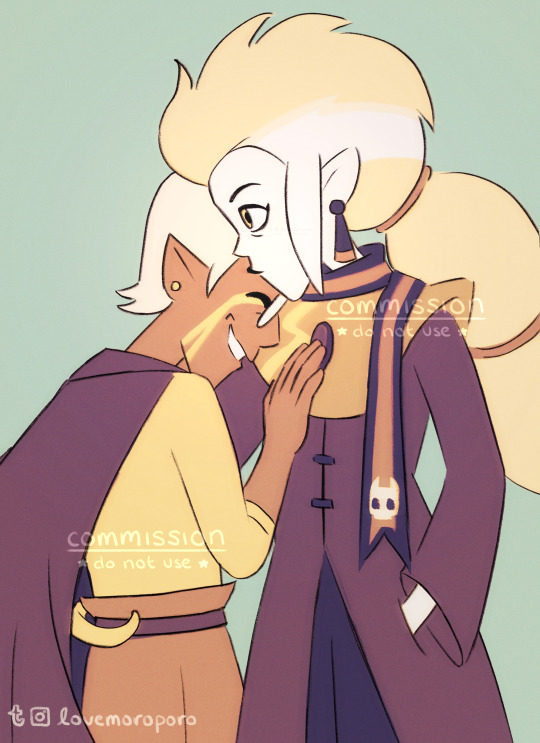
we didnt talk about their fits enough
⭐ kofi | comms | inprnt ⭐
875 notes
·
View notes
Text

NOW ON THE RIGHT BLOG!
So mom of me. haha.
Anyway ... fanfic, fanart... whatever you want is welcome!
A week long TOH fan appreciation of Camila Noceda, the Hexsquad's mom!
156 notes
·
View notes
Text
"Oh, that's easy," she says, and mixes two cleaning products together, face covered in rubber and glass. "This one is called War," she says, as yellow smoke rises from the bowl.
"I can do that," he says, and unscrews the water-pump, reaching in with fouled hands. "Pestilence grows so well in these conditions."
"Here's a monster for you," she says, and doubles a leather belt. "P̴͙͚̎ấ̸̡̻̾̕r̸̨͈̰̝̐̌̔̔ę̵̐̈́͐͠ṇ̷͚̩̼̔͌̐t̵̗̽̌͋ ̸̯̺̳̓͘͝ Knows Best is a classic."
"How many monsters did you want?" he asks, pinning calorie charts on a locked refrigerator. "There are so many to choose from."

251 notes
·
View notes
Text
Jack Black as Tom Bombadil.
Ewan McGregor as Tom Bombadil. Discuss.
42 notes
·
View notes
Text

today i offer you: gideon. tomorrow? who knows.
(close-up below)

4K notes
·
View notes
Photo
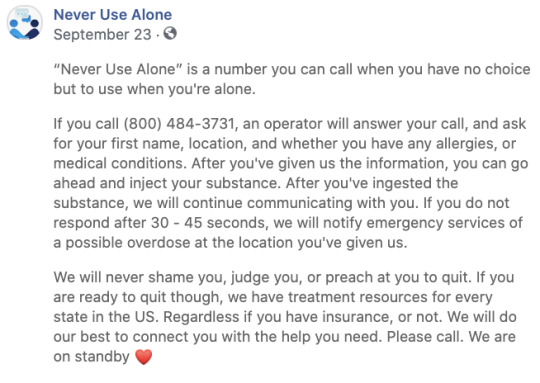
Ending the stigma of drug use will save lives.
168K notes
·
View notes
Text

you both suck & are gay. you're not that special
564 notes
·
View notes
Text
The governor was firm: Nebraska would reject the new federal money for summer meals. The state already fed a small number of children when schools closed. He would not sign on to a program to provide all families that received free or cut-rate school meals with cards to buy groceries during the summer.
“I don’t believe in welfare,” the governor, Jim Pillen, a Republican, said in December.
A group of low-income youths, in a face-to-face meeting, urged him to reconsider. One told him she had eaten less when schools were out. Another criticized the meals at the existing feeding sites and held a crustless prepackaged sandwich to argue that electronic benefit cards from the new federal program would offer better food and more choice.
“Sometimes money isn’t the solution,” the governor replied.
.......
The new $2.5 billion program, known as Summer EBT, passed Congress with bipartisan support, and every Democratic governor will distribute the grocery cards this summer. But Republican governors are split, with 14 in, 13 out and no consensus on what constitutes conservative principle.
One red-state governor (Sarah Huckabee Sanders of Arkansas) hailed the cards as an answer to a disturbing problem. Another (Kim Reynolds of Iowa) warned that they might increase obesity. Some Republicans dismissed the program as obsolete pandemic aid. Some balked at the modest state matching costs. Others hinted they might join after taking more time to prepare.
The program will provide families about $40 a month for every child who receives free or reduced-price meals at school —$120 for the summer. The red-state refusals will keep aid from about 10 million children, about a third of those potentially eligible nationwide.
......
As with Medicaid, poor states are especially resistant, though the federal government bears most of the cost. Of the 10 states with the highest levels of children’s food insecurity, five rejected Summer EBT: Louisiana, Oklahoma, Mississippi, Alabama and Texas.
Like the school lunch program, it serves families up to 185 percent of the poverty line, meaning a family of three would qualify with an income of about $45,500 or less.
......
Some Republicans, in rejecting the aid, found critics in their own ranks. After Gov. Henry McMaster of South Carolina dismissed Summer EBT as a duplicative “entitlement,” State Senator Katrina Shealy, a fellow Republican, wrote a column with a Democratic colleague warning that “hunger does not stop during summer break.”
In an interview, Ms. Shealy said the state should not reject $65 million “just because Biden is president,” and perhaps just partly tongue-in-cheek wrapped her plea in Trumpian bunting: “Everyone wants to say, ‘America First’ — well, let’s feed our children first.”
Oklahoma initially said it rejected the program because federal officials had not finalized the rules. But responding to critics, Gov. Kevin Stitt, a Republican, sharpened his attack, calling Summer EBT a duplicative “Biden administration program” that would “cause more bureaucracy for families.”
Tribal governments, which have influence over large parts of the state, stepped in. Already feuding with Mr. Stitt, they promised to distribute cards to all eligible families on their land, regardless of tribal status, while bearing the $3 million administrative cost. The five participating tribes will cover nearly 40 percent of Oklahoma’s eligible children, most of them not Native American.
“I remain dumbfounded that the governor of Oklahoma would turn down federal tax dollars to help feed low-income children,” said Chuck Hoskin Jr., the principal chief of the Cherokee Nation.
-------------------------
some of the most stunning highlights of this story.
All I got to say is, let's feed the children? every single Democratic Governor took the money to feed the kids, every governor who rejected it, every single one, is a Republican. If you don't vote for Democrats you are STEALING food out of kids mouths.
1K notes
·
View notes

